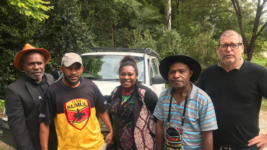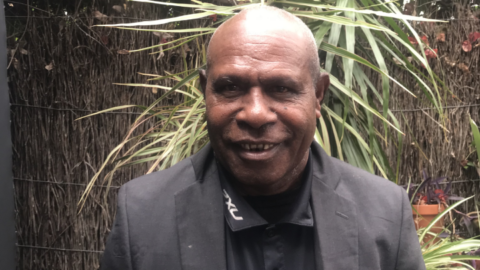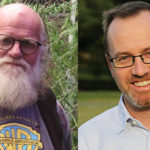In Going Green, Australian Companies to Destroy PNG: Interview With PNG Trust’s Joseph Ka’au

The PNG government approved the Papua LNG project in 2019, which is set to be located at the Elk-Antelope gas field.
Situated in the Gulf Province, the gas field is located inland from the Gulf of Papua and not far upstream from the town of Baimuru, which sits beside the Pie River in the Purari Delta region.
The project’s final approval is set for next year, with extraction proposed to begin in 2027. The field is owned by TotalEnergies, Exxon Mobil, Kumul Petroleum Holdings, as well as Australian resource company Santos. And the project includes a long-contested pipeline being run through the area.
But this project is not the only inroads foreign companies are making into the Baimuru region. Andrew “Twiggy” Forrest has announced Fortescue is planning to establish hydroplants to produce green hydrogen throughout PNG, with one located east of Baimuru along the Purari River.
Brisbane-based Mayur Resources, with former NRL player Darren Lockyer as its face, is planning a series of mines throughout three PNG provinces: Western, Gulf and Central. And Mayur’s plans originally included a new coal-fired powerplant, which it only dropped in July.
For the Gulf Province, Mayur has a sandmining project for Orokolo Bay on the cards, although the Australian company is now threatening to sue Papua New Guinea, as the nation recently cancelled a carbon-offset project it was planning, as it breaches PNG forestry laws.
Colonial legacies
The Papua New Guinea Integral Human Development Trust (PNG Trust) is a decades-old civil society organisation that has a focus on fostering the advancement of its nation’s peoples.
Not many Australians are aware that Papua New Guinea was administered by this country from the early 1900s. And when the island nation regained its self-determination in 1975, it did so by becoming independent of Australia.
So, the PNG Trust delegation has been meeting with various civil society groups and government agencies whilst in Australia to talk about the issues it has with the manner in which these resources companies are encroaching upon their lands.
Greenwashing
Whilst some of these Australian-owned projects set to impact the Gulf Province’s environment could be described as renewable, they certainly all can’t legitimately claim to be green, however that hasn’t stopped the companies spruiking them as being so on their websites or in the media.
Joseph Ka’au, head of the PNG Trust delegation, which is raising awareness about these projects set to impact his homelands, makes the clear point that whilst the climate crisis necessitates going green, his nation’s environment shouldn’t have to bear the burden of this on behalf of the west.
Sydney Criminal Lawyers spoke to PNG Trust board member Joseph Ka’au about the engagement companies, like Mayur Resources, have had with the people of the Purari Delta region, how these projects are likely to benefit the local peoples, and the impact of past foreign development.

Mr Ka’au, you’re currently heading up a delegation from the PNG Integral Human Development Trust on a campaign raising awareness visit in Australia. What does the PNG Trust do?
The PNG Integral Human Development Trust was formed in the early 1990’s by likeminded civil society groups to address social, political, spiritual and economic issues affecting our country.
It focused on literacy programs, using vernacular for children and adults as well. But PNG Trust wasn’t able to continue after funds, mostly donor funds, ceased.
So, what’s the current trip the PNG Trust delegation has made to Australia all about?
This trip is to seek support to revive the group. But it’s also, in support of a women’s group from the Gulf Province of Papua New Guinea.
They’re organising against a backdrop of major resource development projects happening in Baimuru.
I’m from Baimuru. So, I’m helping to organise the women, and also, I’m a board member of PNG Trust.
During your time in Australia, where have you been, and which organisations have you been engaging with?
We’ve been to Brisbane, Sydney and Canberra. And we’ve met with civil society and environmental groups, including Lock the Gate and 350.org in Sydney, DFAT (Pacific /PNG desk) and the Australian Council for International Development (ACFID) in Canberra.
We’ve also met with organisations both in Sydney and Canberra, who might help the women of Baimuru with their formation and plans to engage in social enterprise.
So, why has PNG Trust and the women from Baimuru brought this campaign specifically to Australian shores?
The major resource development projects in Baimuru will be financed and operated by Australian companies, such as Santos, Twiggy Forrest’s Fortescue and Mayur Resources.
The resource projects you refer to are the Papua LNG project to be established at the Elk-Antelope gas field upstream from the town of Baimuru.
“Twiggy” Forrest is also investing in a hydroplant in the Purari Delta region, and further, Brisbane-based Mayur Resources has a number of mines planned for three provinces, including sand mining in the Gulf Province.
So, what’s the position of your delegation in relation to these projects, which will likely have a big impact on your local area?
We’re not against anything, because we don’t know what these companies will be doing in Baimuru. Nobody is telling us anything.
We want these Australian companies to tell us what they’re going to do in our area. They must tell us if their operations might destroy our environment. They must also tell us how we will benefit from these projects.
Currently, we’re in total darkness. We must know these things before the projects start.
The developers of the Papua LNG project are funding an expansion of the Kapuna Hospital in Baimuru. How do you consider this?
With regard to the expansion of Kapuna Hospital, which will be funded by the companies, you will have to ask the people of Kapuna.
It’s a church-run organisation that runs a hospital and a nursing college in Baimuru. It has been operating for the last 60 years. These companies only came yesterday.
There are other compensatory measures in place that will accompany the Elk-Antelope gas field, as PNG legislation stipulates that people living within a 7 kilometre radius of it will receive royalties from the development.
How do you consider these compensatory outcomes against projects that are likely to significantly affect local peoples’ lives and the environment?
These compensatory outcomes are nothing. Total, Santos and Twiggy Forrest are filthy rich companies.
We want an all-weather airstrip in Baimuru. We want a high school in Baimuru. We want all the primary schools to have a full supplement of teachers and classrooms.
We want all the wards to have functioning and fully equipped aid posts. We want our women and girls to be educated to the highest level possible, and we want functioning communications links.
I believe there have already been some indications that Mayur plans to keep the local people out of any benefits the Australian company’s project in the local area might produce, including in terms of employment?
With regard to the sand mining projects, the wardens meeting to get the views of the landowners was held in my tribal village of Upaia.
This meeting was conducted by the officers of the Department of Mining. Company officials at the meeting were asked if they could employ people to work with them and if there were any benefits to the landowners.
Their response was that “there is no money in this project”.
Next question, “So why do you want to do this project?” They think we are stupid.
These companies are promoting their projects as renewable energy operations at a time when the world needs to shift away from fossil fuels, so they sound like projects that might be welcomed.
So, what are we missing here?
Why is the focus to stop fossil fuel production in the developing world?
It is the developed world, including Australia, that has been the major contributor to the escalating extreme weather patterns by their careless abuse of fossil fuels and their consumption patterns.
What does your organisation propose as alternatives?
Right now, the PNG Trust does not have any resources to offer alternatives to address these issues. We need to be up and running again.
And lastly, Mr Ka’au, foreign resource corporations have long been making inroads into Papua New Guinea since independence in 1975.
How would you say the nation and its peoples have fared from these agreements?
The country’s current state of affairs – run down health and education facilities, no enabling infrastructure, lack of communications and much more – can be attributed to the lack of benefits from these projects.
But our government has also contributed to this state of affairs as well.
We need our people, particularly our women and girls, educated, informed and organised.







